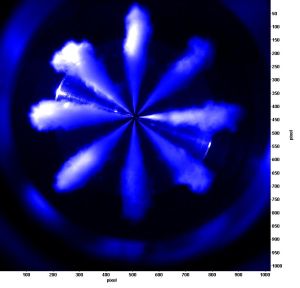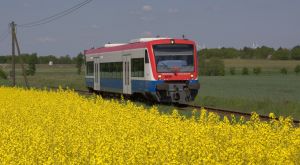In the future, trains and inland water vessels are to run on native fuel based on rapeseed oil – this is the objective of a joint research project of the Institut für Kolbenmaschinen (IFKM) of KIT and the Technology and Support Centre in the Centre of Excellence for Renewable Resources (TFZ), Straubing. Fuel based on rapeseed oil allows for a considerable reduction of greenhouse gas emissions without competing with food or animal production. The scientists are studying how efficient combustion can be achieved with minimum pollutant emission.
In a high-pressure test rig made of glass, the researchers working with the Chair Professor Ulrich Spicher observe and optimize the breakup of the rapeseed oil fuel in the combustion chamber into fine droplets and its mixing with combustion air. In this way, the largest possible fraction of the energy stored in the fuel is converted into engine power with minimum pollutant emissions. “In the next year, we will continue our studies using real engines in rail cars and inland water vessels,” reports Dr. Sören Bernhardt from IFKM. These engines will be modern diesel engines whose injection systems are tailored specially to the use of fuel based on rapeseed oil. For this reason, the IFKM scientists cooperate closely with the researchers of the TFZ, who focus on fuel quality in particular.

Injection of rapeseed oil. (Photo: Markus Lüft, KIT)
“The use of rapeseed oil fuel represents an immediately available possibility of reducing anthropogenic (caused by humans) carbon dioxide emissions (CO2),” explains Dr. Bernhardt. During combustion, biofuels only emit about as much CO2 as was taken up by the plants from the atmosphere during growth. When considering cultivation, processing, and transportation, fuel based on rapeseed oil according to DIN 51605 leads to to at least 57% fewer greenhouse gas emissions than diesel fuel. “In agricultural areas in Germany, cultivation of plants with balanced crop rotation may suffice to replace about 10% of the total consumption of fossil diesel fuel without adversely affecting food and feedstuff production,” explains Dr. Edgar Remmele, TFZ. This potential is one reason why KIT and TFZ scientists focus on the use of rapeseed oil fuel in trains, inland navigation vessels, and agriculture. Moreover, the spectrum of engines for which adaptation measures have to be developed is manageable and it can be ensured that these engines are always operated with the same fuel. “In the future, more attention should be paid to the use of pure biofuels in appropriately selected areas. At the same time, it will be important to reduce fuel consumption. This is the only way to reach the climate protection objectives,” says Remmele.
The project is funded by the Deutsche Bundesstiftung Umwelt (German Federal Environmental Foundation) and supported by several companies in the engine and supply industries as well as by potential users. Rapeseed cultivation and fuel production in Germany fulfill the requirements of the German Sustainability Ordinance, which ensures observation of high environmental standards. In addition, production of rapeseed oil fuel gives rise to valuable protein feedstuff that can replace imported soy.
The Mobility Systems Center pools KIT activities relating to vehicle technology. Presently, 40 KIT institutes with about 800 employees are working on methodological and technical fundamentals for tomorrow’s vehicles. It is their objective to develop energy-efficient, low-emission, and safe vehicles and mobility concepts. The researchers also consider the complex interactions of vehicle, driver, traffic, and society.
Under the heading of “Future Mobility”, KIT will present its scientific activities on its new “Campus East – Mobility and Innovation” during an Open Day on July 02. More information can be found at: www.pkm.kit.edu/3072.php
Being “The Research University in the Helmholtz Association”, KIT creates and imparts knowledge for the society and the environment. It is the objective to make significant contributions to the global challenges in the fields of energy, mobility, and information. For this, about 10,000 employees cooperate in a broad range of disciplines in natural sciences, engineering sciences, economics, and the humanities and social sciences. KIT prepares its 22,800 students for responsible tasks in society, industry, and science by offering research-based study programs. Innovation efforts at KIT build a bridge between important scientific findings and their application for the benefit of society, economic prosperity, and the preservation of our natural basis of life. KIT is one of the German universities of excellence.

